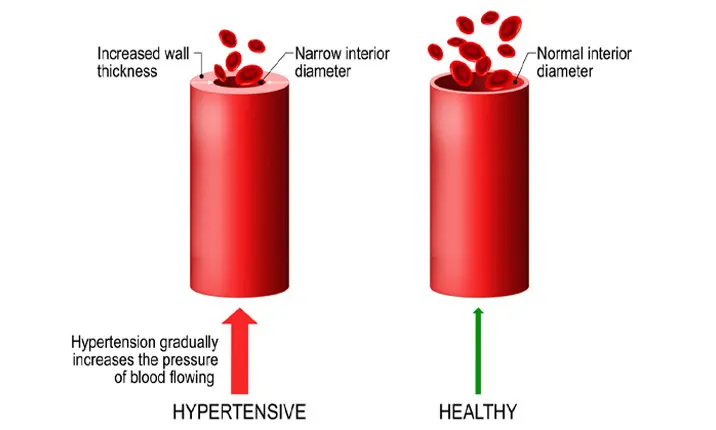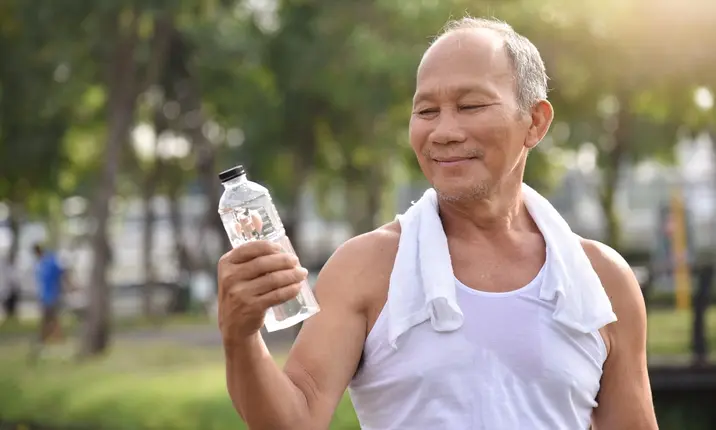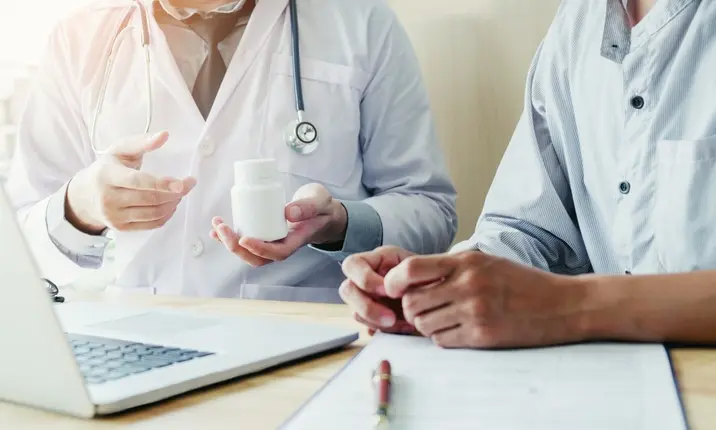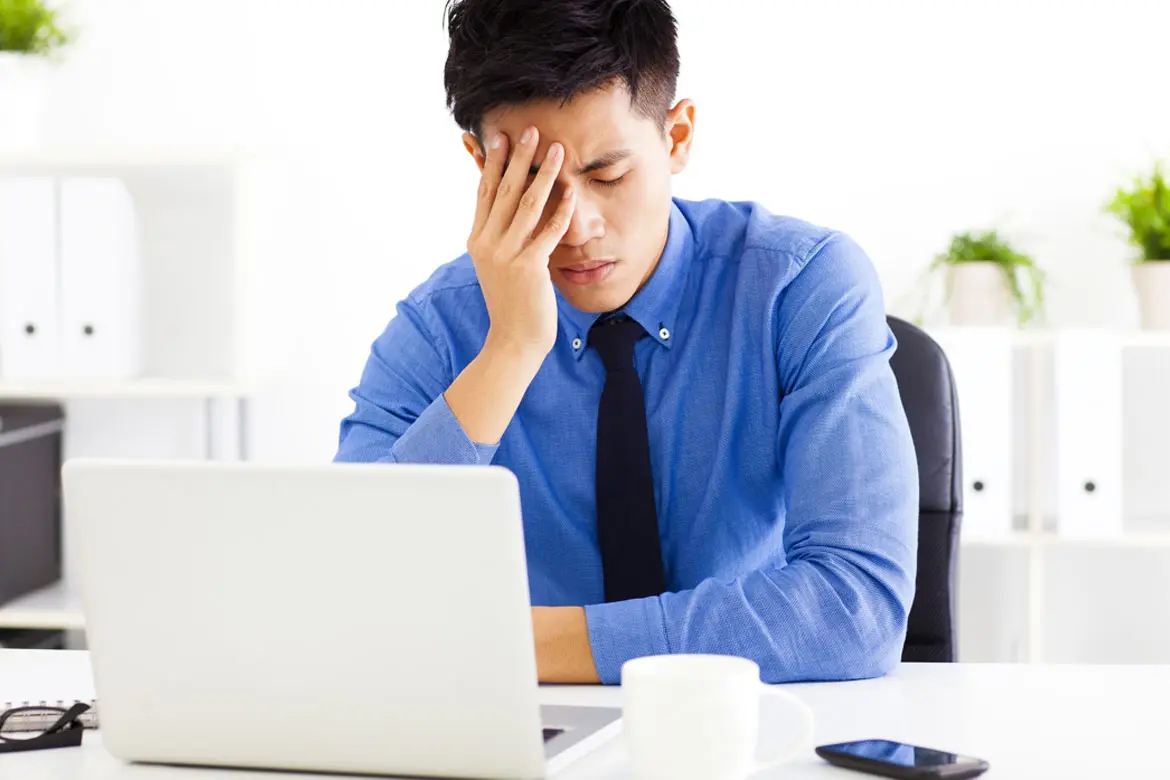
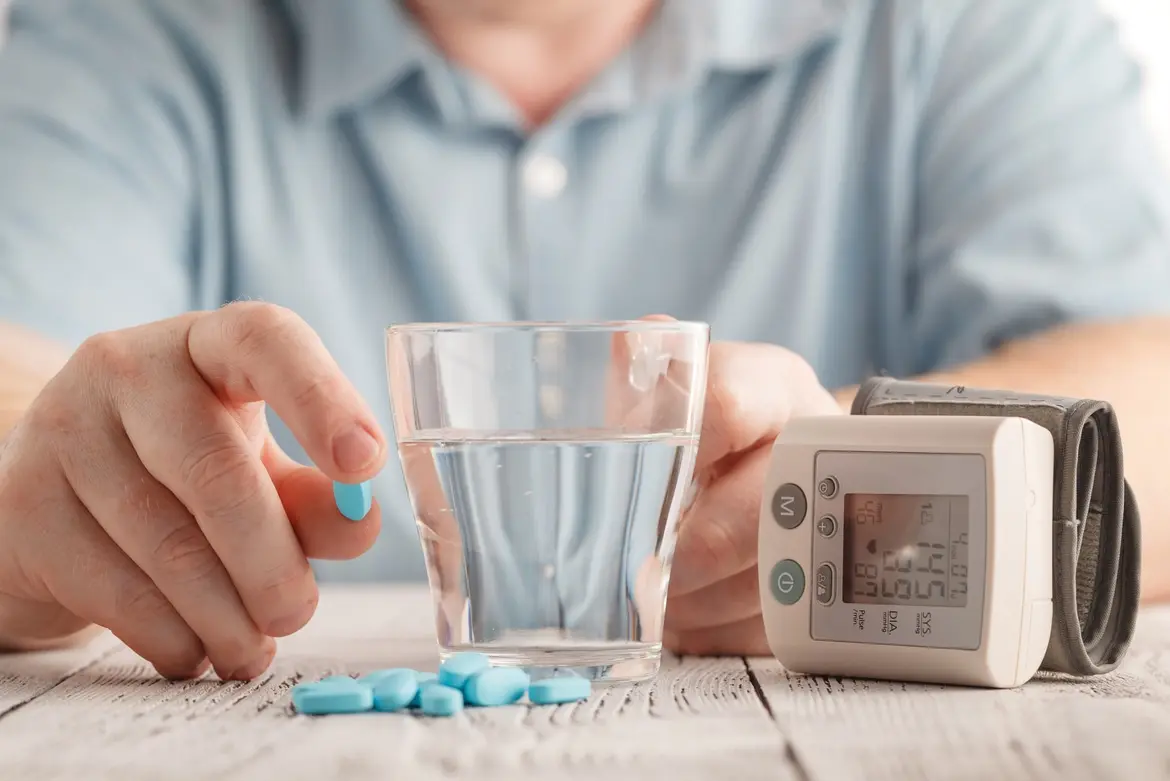
Source: Shutterstock
How to Treat High Blood Pressure
Last updated: Tuesday, February 9, 2021 | 4 min reading time
High blood pressure officially affects 27.3% of Singapore’s population. But in reality, that number is likely to be far greater. How can we go about treating this silent killer?
Dr Kenneth Guo, cardiologist at Mount Elizabeth Novena Hospital, explains how hypertension (high blood pressure) is treated.
What is high blood pressure?
As the name suggests, high blood pressure (also known as hypertension) is the force of blood pushing against the walls of your blood vessels. If you have high blood pressure, this force is stronger, which means your heart needs to work extra hard to transport blood around your body.
Doctors measure both systolic pressure (the pressure in the arteries as the heart contracts) and diastolic pressure (the pressure in the arteries as the heart relaxes) to determine an accurate blood pressure reading.
Normal blood pressure
Normal blood pressure is generally considered to be a systolic pressure of less than 120mmHg and a diastolic pressure of less than 80mmHg.
High blood pressure
A person has high blood pressure when their blood pressure, which is the force of blood flowing through the blood vessels, is consistently high. There are several categories of high blood pressure:
| Blood pressure category | Systolic mm Hg | Diastolic mm Hg | |
|---|---|---|---|
| Elevated | 120 – 129 | and | < 80 |
| Hypertension stage 1 | 130 – 139 | or | 80 – 89 |
| Hypertension stage 2 | ≥ 140 | or | ≥ 90 |
| Hypertension crisis | > 180 | and/or | > 120 |
Why is high blood pressure known as the 'silent killer'?
Most patients with high blood pressure have few or no symptoms, so it can be hard for them to recognise they have a problem and know whether treatment is working.
Symptoms of high blood pressure
Symptoms like light-headedness, facial flushing or headaches might only set in when systolic blood pressure rises higher than 160 mmHg or above.
High blood pressure does not have any symptoms unless it is very severe. The best way to know if you have high blood pressure is through regular checkups or monitoring at home.
Symptoms of severe high blood pressure may include:
- Severe headaches
- Nosebleed
- Fatigue or confusion
- Vision problems
- Chest pain
- Difficulty breathing
- Irregular heartbeat
- Blood in the urine
- Pounding in the chest, neck or ears
According to the American Heart Association, you should have a high blood pressure screening during every visit to the doctor, or at least every 2 years, from the age of 20. You'll need more regular screenings if your blood pressure is higher than 120/80 mmHg.
Complications of high blood pressure
High blood pressure increases your risk of heart attack, stroke, heart failure and kidney disease. A 40 year old obese male with a blood pressure of about 141/91 mmHg, for example, will be 6.8 times more likely to have a stroke than a healthy individual.
While these health risks may increase if your high blood pressure worsens, they can generally be improved with treatment. That's why it's so important to go for regular check-ups, and seek treatment early.
How to treat and lower high blood pressure
Lifestyle changes
Lifestyle changes can be a huge factor when it comes to treating high blood pressure, as is evident by the Ministry of Health's suggestions for a healthier heart:
| Lifestyle measure | Expected decrease in systolic blood pressure (mmHg) |
| Limiting alcohol intake to less than 1 unit/day for females and less than 2 units/day for males | 2 – 4 |
| Regular walks for 30min, 5 times a week | 4 – 9 |
| Minimising salt intake | 2 – 8 |
| Weight management | 1 – 2 per kg weight loss |
| Quitting smoking | 1 – 5 |
Monitor your blood pressure
Keep checking your blood pressure at home. Most people diagnosed with high blood pressure want to lower their blood pressure to 130/80 mm Hg. However, your doctor is the best person to advise you on your personal target blood pressure. Work with your doctor to develop a plan to lower blood pressure.
Healthy diet
Eat lots of fruits, vegetables, whole grains and low-fat dairy, and less of saturated and total fat.
Exercise
Aim for at least 90 to 150 minutes of exercise per week. They should include:
- Aerobic exercise: walking, jogging, cycling, swimming or dancing
- Resistance exercise: lifting weights such as dumbbells, kettlebells, or sandbags, using resistance bands, squats, push-ups and chin-ups
Limit alcohol intake
Limit your alcohol intake to 1 drink a day for women or 2 a day for men.
One standard drink contains 10 grams of alcohol. This equals to 285 ml of full-strength beer, 425 ml of low strength beer, 100 ml of wine and 30 ml of spirits.
Quit smoking
When you smoke, your blood pressure increases for many minutes after you finish. Stopping smoking helps your blood pressure return to normal. It also can reduce your risk of heart disease and improve your overall health.
Minimise salt intake
Ideally, try to consume less than 1,500 mg of sodium a day. If your daily consumption is way more than this, aim for at least a 1,000 mg per day reduction.
The Joint National Committee on Prevention, Detection, Evaluation and Treatment of High Blood Pressure (JNC) released new guidelines in 2014 for the proper management of high blood pressure.
They analysed evidence worldwide to recommend treatment goals for patients living with high blood pressure. For most people, the goal is 140/90mmHg. However, for elderly people, this is usually slightly higher at 150/90mmHg.
Your doctor will help you to set a treatment goal and regularly monitor your progress to help you stay on target.
Which medications are used to treat high blood pressure?
Various medication combinations can be used to help treat high blood pressure. These may include:
- Diuretics, which help to reduce the amount of fluid in your arteries
- Calcium channel blockers, which help to relax your arteries and slow your heart rate
- ACE-inhibitors, which help to relax your arteries and decrease blood volume
- Angiotensin Receptor Blockers (ARBs) which help to enlarge your arteries
The combination and concentration of these medications depends entirely on your needs and body type. Some examples of treatment plans include:
- Starting on one drug, with your doctor slowly adjusting the dosage for maximum benefit, before adding a second drug
- Starting on one drug and then adding a second drug, before your doctor slowly adjusts each dosage for maximum benefit
- Starting two drugs at the same time, either taking 2 separate pills or a single pill combination
The JNC recommends combination therapy for patients with a high blood pressure over 160/100 mmHg, or for elderly patients with a high blood pressure over 170/110mmHg. This has been shown to get the patient on board with their treatment quicker, as well as help them to achieve their treatment goals faster.
Beta-blockers to treat high blood pressure
You've probably heard of beta-blockers – they're the little pills that help to slow your heart rate by blocking the effects of certain hormones in your system.
But nowadays, they're not the first port of call when it comes to high blood pressure. This is partly due to a recent study that compared the effects of ARB and beta-blockers in patients aged between 55 and 80 years old, which found that ARB are 13% more effective at reducing the risk of death or stroke.
In some parts of the world, like England and Canada, beta-blockers are still a popular first-treatment option for patients under 80. They are also useful for treating other conditions, including:
- Heart disease
- Chronic heart failure
- Atrial fibrillation (irregular heartbeat)
- Thyrotoxicosis (caused by an overactive thyroid gland)
- Liver cirrhosis (alcohol-related liver disease)
- Migraines
How is high blood pressure treated in the elderly?
An uncommonly high systolic pressure together with an uncommonly low diastolic pressure might give a blood pressure reading like 150/70mmHg. This is known as isolated systolic hypertension, and it is particularly common in the elderly.
The most common cause is arteries stiffening with age, but it can also be caused by:
- Anaemia (not enough healthy red blood cells in the body)
- Hyperthyroidism (an overactive thyroid gland)
- Arteriovenous fistula (an abnormal connection between an artery and vein)
- Severe aortic regurgitation (leaking valves in the heart)
A doctor will explore each of the possible causes before treating the condition. They will also be careful to avoid dropping the diastolic pressure too low with medication.
It's worth noting that elderly individuals are especially prone to postural hypotension, ie. low blood pressure that occurs when standing up after sitting or lying down. It normally doesn't last long, but it can make them feel dizzy or even faint. One study found that elderly individuals have a 43% higher risk of hip fracture if they fall within the first 45 days of taking high blood pressure medication. If you are worried an elderly relative may be at risk, speak to your doctor.
Armstrong, C. (2014). JNC8 Guidelines for the Management of Hypertension in Adults. American Family Physician 90(7):503-4.
Austin, P.C, Butt, D.A., Glazier, R.H., Gomes, T., Mamdani, M. & Tu, K. (2012). The Risk of Hip Fracture After Initiating Antihypertensive Drugs in the Elderly. Archives of Internal Medicine 172(22):1739-44.
Bakris, G.L., Black, H.R., Chobanian, A.V., Cushman, W.C., Green, L.A., Izzo, J.L. et al. (2003). Seventh report of the Joint National Committee on the Prevention, Detection, Evaluation, and Treatment of High Blood Pressure. Hypertension 42(6):1206-52.
Bangalore, S., Kamalakkannan, G., Messerli, F.H & Parkar, S. (2007). Fixed-dose Combinations Improve Medication Compliance: a Meta-analysis. The American Journal of Medicine 120(8):713-9.
Beevers, G., Dahlof, B., de Faire, U., Devereux, R.B., Julius, S., Kjeldsen, S.E. et al. (2002). Cardiovascular Morbidity and Mortality in the Losartan Intervention for Endpoint Reduction in Hypertension Study (LIFE): a Randomised Trial Against Atenolol. Lancet 359(9311):995-1003.
Burt, V., Gu, Q., Nwankwo, T. & Yoon, S.S. (2013). Hypertension Among Adults in the US: National Health and Nutrition Examination Survey, 2011-2012. National Center for Health Statistics.
Corrao, G., Heiman, F., Merlino, L., Nicotra, F., Parodi, A., Zambon, A. et al. (2011). Cardiovascular Protection by Initial and Subsequent Combination of Antihypertensive Drugs in Daily Life Practice. Hypertension 58(4):566-72.
Crikelair, N., Glazer, R., Levy, D., Meng, X., Rocha, R. & Weir, M.R. (2007). Time to Achieve Blood-Pressure Goal: Influence of Dose of Valsartan Monotherapy and Valsartan and Hydrochlorothiazide Combination Therapy. American Journal of Hypertension 20(7):807-15.
Duh, M.S., Falvey, H., Gradman, A.H., Lafeuille, M.H, Lefebvre, P. & Parise, H. (2013). Initial Combination Therapy Reduces the Risk of Cardiovascular Events in Hypertensive Patients: A Matched Cohort Study. Hypertension 61(2):309-18.
Khan, N. & McAlister, F.A. (2006). Re-Examining the Efficacy of Beta-Blockers for The Treatment Of Hypertension: a Meta-analysis. Canadian Medical Association Journal 174(12):1737-42.
The Facts About High Blood Pressure. (2017, November 30) Retrieved December 16, 2020, from https://www.heart.org/en/health-topics/high-blood-pressure/the-facts-about-high-blood-pressure
Symptoms of High Blood Pressure. (2020, July 16) Retrieved December 16, 2020, from https://www.webmd.com/hypertension-high-blood-pressure/guide/hypertension-symptoms-high-blood-pressure
10 Ways to Control High Blood Pressure Without Medication. (2019, January 09) Retrieved December 16, 2020, from https://www.mayoclinic.org/diseases-conditions/high-blood-pressure/in-depth/high-blood-pressure/art-20046974
What is a Standard Drink? (n.d.) Retrieved December 16, 2020, from https://healthywa.wa.gov.au/Articles/U_Z/What-is-a-standard-drink
Austin, P.C, Butt, D.A., Glazier, R.H., Gomes, T., Mamdani, M. & Tu, K. (2012). The Risk of Hip Fracture After Initiating Antihypertensive Drugs in the Elderly. Archives of Internal Medicine 172(22):1739-44.
Bakris, G.L., Black, H.R., Chobanian, A.V., Cushman, W.C., Green, L.A., Izzo, J.L. et al. (2003). Seventh report of the Joint National Committee on the Prevention, Detection, Evaluation, and Treatment of High Blood Pressure. Hypertension 42(6):1206-52.
Bangalore, S., Kamalakkannan, G., Messerli, F.H & Parkar, S. (2007). Fixed-dose Combinations Improve Medication Compliance: a Meta-analysis. The American Journal of Medicine 120(8):713-9.
Beevers, G., Dahlof, B., de Faire, U., Devereux, R.B., Julius, S., Kjeldsen, S.E. et al. (2002). Cardiovascular Morbidity and Mortality in the Losartan Intervention for Endpoint Reduction in Hypertension Study (LIFE): a Randomised Trial Against Atenolol. Lancet 359(9311):995-1003.
Burt, V., Gu, Q., Nwankwo, T. & Yoon, S.S. (2013). Hypertension Among Adults in the US: National Health and Nutrition Examination Survey, 2011-2012. National Center for Health Statistics.
Corrao, G., Heiman, F., Merlino, L., Nicotra, F., Parodi, A., Zambon, A. et al. (2011). Cardiovascular Protection by Initial and Subsequent Combination of Antihypertensive Drugs in Daily Life Practice. Hypertension 58(4):566-72.
Crikelair, N., Glazer, R., Levy, D., Meng, X., Rocha, R. & Weir, M.R. (2007). Time to Achieve Blood-Pressure Goal: Influence of Dose of Valsartan Monotherapy and Valsartan and Hydrochlorothiazide Combination Therapy. American Journal of Hypertension 20(7):807-15.
Duh, M.S., Falvey, H., Gradman, A.H., Lafeuille, M.H, Lefebvre, P. & Parise, H. (2013). Initial Combination Therapy Reduces the Risk of Cardiovascular Events in Hypertensive Patients: A Matched Cohort Study. Hypertension 61(2):309-18.
Khan, N. & McAlister, F.A. (2006). Re-Examining the Efficacy of Beta-Blockers for The Treatment Of Hypertension: a Meta-analysis. Canadian Medical Association Journal 174(12):1737-42.
The Facts About High Blood Pressure. (2017, November 30) Retrieved December 16, 2020, from https://www.heart.org/en/health-topics/high-blood-pressure/the-facts-about-high-blood-pressure
Symptoms of High Blood Pressure. (2020, July 16) Retrieved December 16, 2020, from https://www.webmd.com/hypertension-high-blood-pressure/guide/hypertension-symptoms-high-blood-pressure
10 Ways to Control High Blood Pressure Without Medication. (2019, January 09) Retrieved December 16, 2020, from https://www.mayoclinic.org/diseases-conditions/high-blood-pressure/in-depth/high-blood-pressure/art-20046974
What is a Standard Drink? (n.d.) Retrieved December 16, 2020, from https://healthywa.wa.gov.au/Articles/U_Z/What-is-a-standard-drink
 Brain & Spine Care
Brain & Spine Care